Depleted uranium from a German enrichment plant is being shipped to Russia for reprocessing. A local politician has sounded the alarm, calling for a halt to the ships and saying the plant itself should be closed.
“We thought the train was heading for France, and were astonished to discover that the transport was going to Russia.”This chance of discovery by Udo Buchholz, an environmental activist who is a green councillor in the North Rhine-Westphalia town of Gronau, is currently making headlines.
Buchholz told DW that he wrote to the North Rhine-Westphalian economics minister in August, saying he had some questions about the uranium enrichment plant in Gronau, operated by the company URENCO. In mid-September, he received a reply stating that “around 600 tons of UF6 depleted uranium was sent to Russia for re-enrichment” in a special transport, which had left the site at the end of July. Buchholz was surprised. There have been no such transports to Russia for a long time, and no official information that they have been resumed.
READ MORE: Moscow residents fight back against ‘second Chernobyl’
Depleted uranium-uranium hexafluoride – is a colorless radioactive powder that is a by-product of manufacturing fuel for nuclear power plants. URENCO, a partnership involving German, British and Dutch energy companies, has operated an enrichment facility in Gronau since 1985. The depleted uranium is also stored there, in containers, out in the open. In the mid-1990s, Russia took on the processing of the uranium. Buchholz estimates that by 2010 around 30,000 tons had been sent to Russia, destined for processing plants in the Urals and Siberia.
The nuclear industry refers to the uranium not as “nuclear waste” in this context, but as “recyclable material.”Russian state nuclear power company Rosatom uses the same term. After processing, the depleted uranium is returned to Germany, a company spokesman told the Russian media group RBC on Wednesday. DW approached the North Rhine-Westphalian Economics Ministry, but it declined to comment, referring us instead to the Federal Office of Economics and Export Control (BAFA). As of Thursday, we had not received an answer. A similar request to URENCO also went unanswered.
READ MORE: Germany’s atomic phaseout: How to dismantle a nuclear power plant
Opponents of nuclear power in both Germany and Russia have protested against the uranium enrichment in Russia for years. Their criticisms included the dangers involved in transportation. Uranium hexafluoride turns into a gas when heated; In the event of an accident, if it came into contact with water, it could create highly toxic hydrofluoric acid.
Storage of the uranium in Russia has also been criticized. It is kept in the open air, similar to the way it’s stored in Germany. However, the main accusation is that only a small quantity of uranium is returned to Germany after processing. The rest stays in Russia are effectively as nuclear waste.
“The truth is that uranium from URENCO will remain on the premises of Russian companies, in addition to almost 1 million tons of nuclear waste from Russia’s own production,” says Alexandra Koroleva. She is the founder and head of the Russian environmental organization Ecodefense, which protests against these kinds of shipments. “Experience shows that more than 90 percent of the uranium remains in Russia,” she told DW. It’s forbidden in Russia to import nuclear waste. The environmentalist — who applied for asylum in Germany a few months ago as a result of pressure from Russian authorities — says that its importation is concealed using terms like “strategic material” and “processing.”
READ MORE: Nuclear waste in disused German mine leaves a bitter legacy
Rashid Alimov from Greenpeace in Russia believes that money may be part of the story. “The export to Russia is effectively trying to avoid considerable expense for the Western European nuclear industry,” he told DW. In recent years, uranium from Gronau has been sent to France for processing. So this year, when more and more uranium transports began leaving Gronau, it was assumed that the trains were bound for France – not for a Dutch port, to be taken by ship to Russia, Udo Buchholz notes.
However, the anti-nuclear activist says the fact that, after processing, the uranium ends up as nuclear waste in Russia is normal practice. “In the area of uranium enrichment, it’s standard procedure for plants that enrich the uranium to keep the waste,” says Buchholz. The same is true of Gronau, he says. That’s why environmentalists like him aren’t just calling for an end to the ships, but for the plant itself to be closed as well.
Author: Roman Goncharenko
Like us on Facebook to see similar stories
Please give an overall site rating:

Be the first to comment on "Tigers re-located to Free State from Germany"